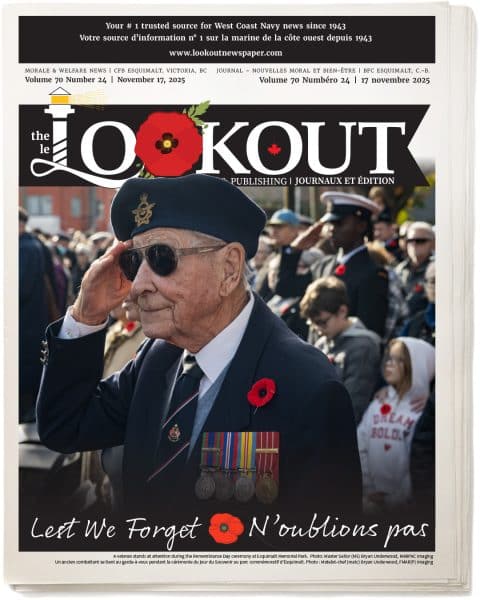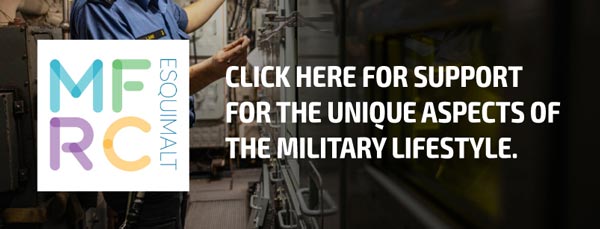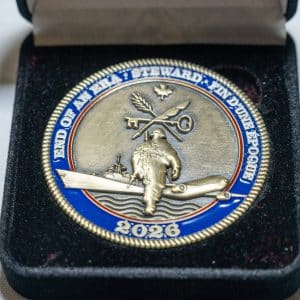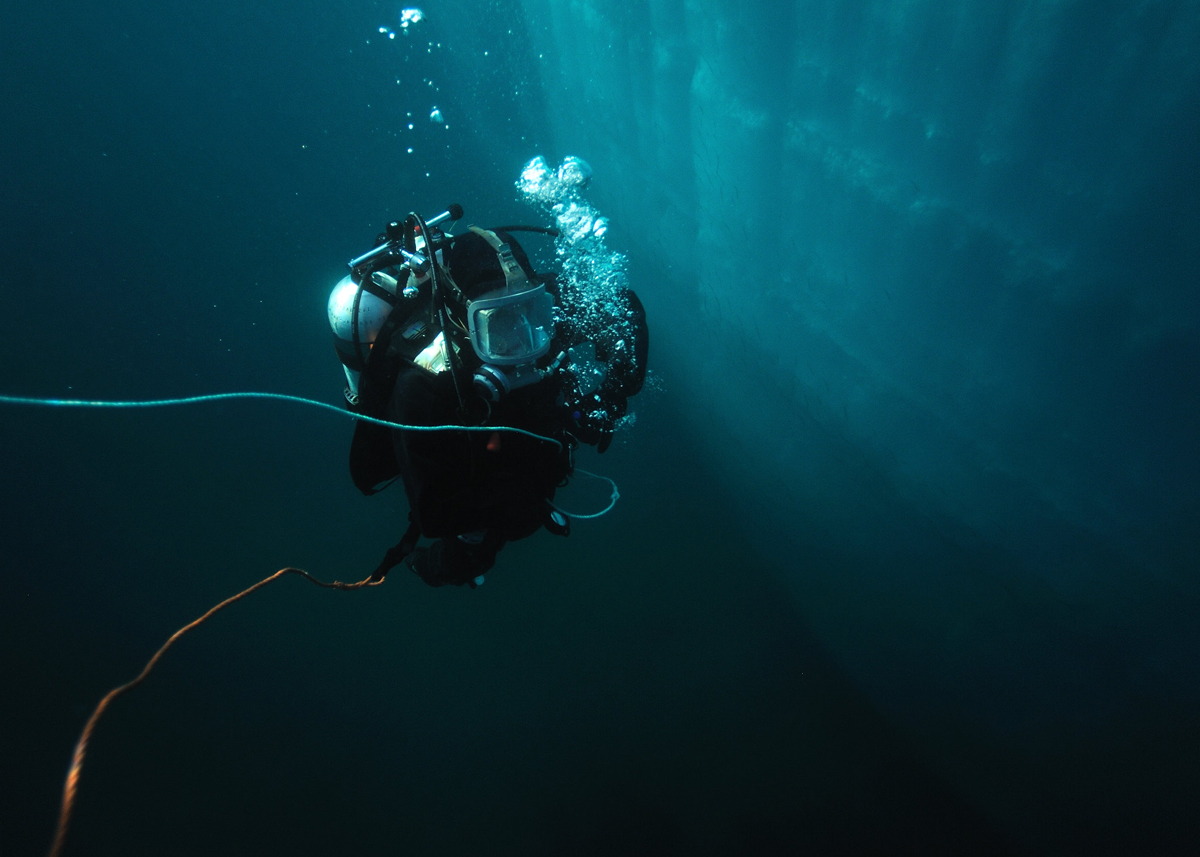
Image courtesy of Combat Camera.
Lt(N) Jake Kresky
Fleet Diving Unit Pacific
“To provide High-Readiness Clearance Diving teams responsible for delivering Mine Countermeasures Diving, Maritime Explosive Ordnance Disposal and in-water maintenance and repair support worldwide on behalf of the CAF.”
This is the mission statement of Fleet Diving Unit Pacific (FDU(P)), where for ten months, the candidates of Clearance Diver Course 0018 and Clearance Diving Officer Course 0020 have been pursuing the ultimate goal of becoming qualified Clearance Divers.
Canadian Clearance Divers are the diving and underwater demolition experts within the Canadian Armed Forces. Expected to be proficient in all underwater tasks with the skills and knowledge to adapt to new challenges, they deploy across the world in many dive- and demolition-focused operations and exercises. Clearance Divers also serve Canadians at home by conducting Explosive Ordnance Disposal to render safe and dispose of hazardous munitions.
With an expectation to be physically fit, mentally resilient, and fearless in the face of adversity, Clearance Diver candidates are challenged to demonstrate all these qualities from the very first day of the course. Rigorous and consistent physical training and testing ensure that candidates are in the proper form required to meet the high standards of the course and the trade. In the initial weeks, the candidate’s skills are tested and refreshed to ensure everyone is up to the standard attained in their Ship’s Diver and Combat Diver courses to build on those existing skills.
The recompression chamber
Candidates were qualified on new systems, including various recompression chambers in service at the unit. The recompression chamber is an essential safety tool used to recompress divers suffering from dive-related injuries. This system is also used to test new dive systems and develop the tables used by all Canadian Armed Forces divers.
During this phase, candidates were also qualified to operate multiple chambers, act as event recorders for a recompression treatment, and act as the inside tender to support a patient being treated. Officer candidates were also qualified to supervise treatments and respond to various emergency scenarios.
The Ultra Lightweight Surface Supplied Dive System
Concurrently with the recompression chamber, candidates were trained on the Ultra Lightweight Surface Supplied Dive System. This system allows divers to work for extended periods of time underwater while maintaining communications with the surface.
During this phase, candidates were introduced to deep diving with decompression on compressed air, operating at approximately 42 metres. Once qualified on this system, it is employed in realistic working scenarios which train candidates in the operation of pneumatic tools underwater, including chainsaws, grinders and jackhammers.
The basics
In their next phase, candidates were introduced to the basics of mine identification, recognition and exploitation. Utilizing the Sharkmarine, a portable sonar and underwater navigation tool, candidates learned to locate and identify underwater mines and recover them for exploitation and disposal.
In January, candidates travelled to CFB Gagetown to complete their Conventional Munitions Disposal Basic (CMD-B) and Improvised Explosive Device Assistant (IED-A) courses. On CMD-B, candidates learned to identify a wide range of conventional military munitions and how to dispose of them using explosives safely. On IED-A, candidates were introduced to the various tools and methods of responding to an improvised explosive device and assisting a qualified operator in neutralizing a device.
After returning to FDU(P), candidates were instructed by Boatswains from the Pacific Fleet in the operation of rigid-hull inflatable boats (RHIBs) and jetboats, as well as the rigging for the cranes employed by FDU(P)’s Yard Dive Tender vessels.
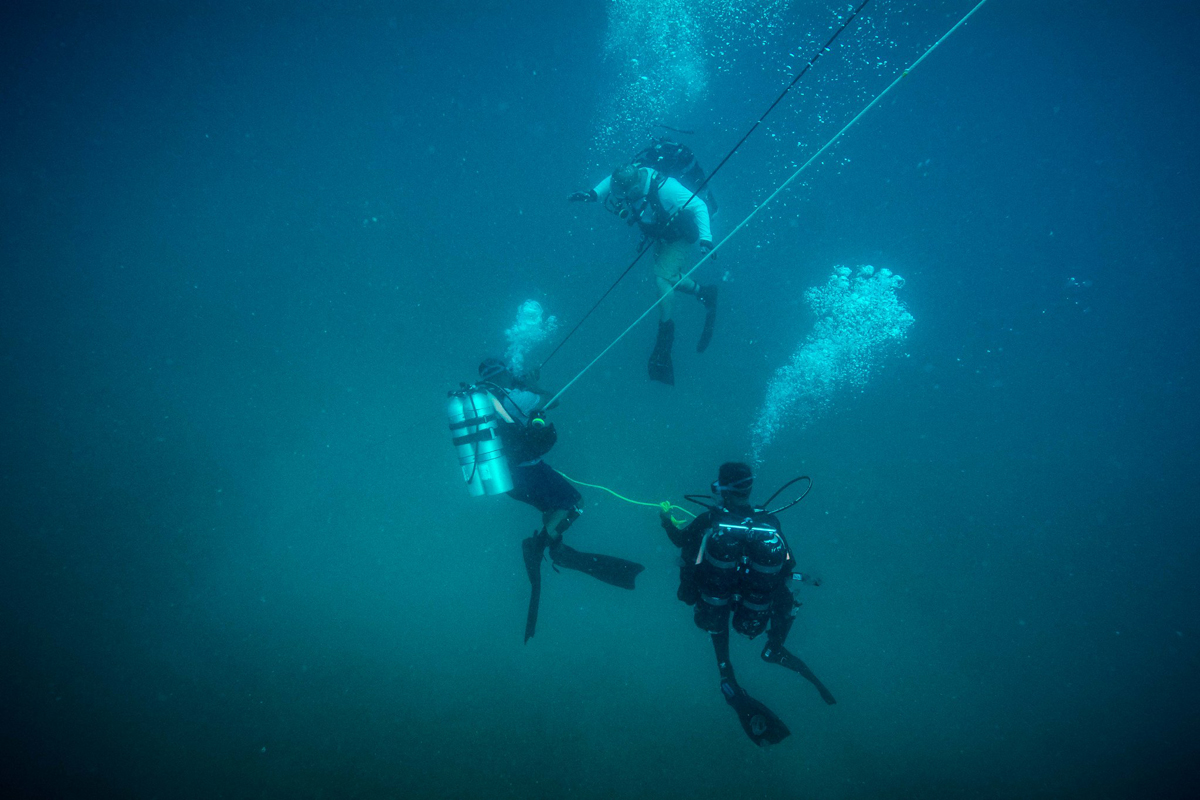
Image courtesy of Combat Camera.
Surface Supplied Breathing Apparatus
Back on the dive side, candidates began training on the Surface Supplied Breathing Apparatus (SSBA aka ʻHelmet Divingʼ). SSBA is used for deep diving up to a maximum depth of 90 meters for salvage, recovery, and working dives, such as underwater welding. The culmination of this phase is a two-week trip to Brentwood Bay onboard FDU(P)’s two Yard Dive Tenders.
Following the SSBA training, candidates headed to Whirl Bay Underwater Demolition Range in Metchosin. During this phase, candidates refreshed their demolition training and employed it in realistic scenarios conducting underwater demolitions against simulated mine targets.
In the final phase of the course, candidates trained at Naval Fleet School Pacific in basic welding and cutting to be proficient underwater.
A qualified Clearance Diver
Once qualified and posted to a diving unit, candidates will continue to refine their skills for the remainder of their careers. The Clearance Diver course is unique in the Canadian Armed Forces for its length, intensity, and depth of skills developed.
Those who are successful will be expected to use and employ everything they have learned in real-world scenarios anywhere in the world on short notice. Many candidates will deploy on their first international exercise within months of graduating. The challenge of completing this course is matched only by the reward of joining such a specialized and tight-knit trade.
As the candidates of CD 0018/CLDO 0020 look forward to completing their ten months of training and starting their careers as Clearance Divers, each is proud of what they have achieved and cannot wait to get out and start doing business.
“Strength in Depth”
